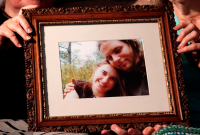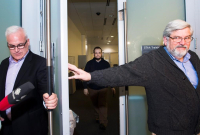Support strong Canadian climate journalism for 2025
Globe-trotters who deliberately flout government travel advisories are actively placing themselves both in harm's way and beyond the reach of most traditional rescue efforts if disaster strikes, security experts said Saturday.
The case of a Canadian man held in captivity in Afghanistan for five years highlights the many risks of venturing into countries where the government has little recourse for helping its citizens.
Joshua Boyle and his American wife Caitlan Coleman were abducted in October 2012 and held in captivity for five years by the Haqqani Network, a group linked to the Taliban. The couple gave birth to four children and endured the slaying of one of them before being rescued by Pakistani commandos on Wednesday.
Security advisers say the length of time the family spent in captivity is not surprising given Canada's official stance on negotiating with terrorist organizations as well as the limited intelligence resources available to government officials.
Security consultant David Hyde said Canada telegraphs its ability to help citizens through its travel advisories, which groups countries into four categories. Afghanistan joins nations such as Iraq and North Korea in the class of destinations that Canada suggests avoiding entirely.
Those who opt not to heed the warnings, he said, place the government in a difficult position by forcing them to try to intervene in areas where they're poorly equipped to do so.
"There's an official posture that we don't do this, but of course we care, and we will try to bring forward information to facilitate the release," Hyde said in a telephone interview. "Behind the scenes, the government gets very involved with a wide variety of interactions to try and lead towards some kind of repatriation."
The Canadian government did not immediately respond to a request for comment, but has consistently stated that it will not negotiate with or pay ransomed to terrorists.
Hyde said many western countries adopt this position, fearing that leniency on this point will make its citizens more likely targets for abduction when travelling abroad.
But in cases where citizens run afoul of "bad actors," Hyde said Canada will typically make use of whatever resources are at their disposal.
This can include tapping into local intelligence contacts, which Hyde said are typically scarce in countries with strong travel advisories.
An alternative approach, he said, is to work with other countries who may have a more robust network in place, he said.
Such may have been the case in 2016 when Colin Rutherford, a Toronto resident vacationing in Pakistan to study historic sites, was rescued by helicopter after five years in Taliban custody.
Canada credited the government of Qatar for playing a key part in Rutherford's release, though it didn't provide details of what the Middle East country's involvement was.
Eventually, however, Hyde said government resources run dry and the families of those in captivity are usually left to fend for themselves.
Such was the case for Alberta journalist Amanda Lindhout, who along with Australian photographer Nigel Brennan was seized by masked men while covering a story in Somalia and held prisoner for more than a year.
Lindhout's mother has spoken in court of her family's desperate attempts to raise funds to pay the US$2.5 million ransom the kidnappers were seeking. In the end, the Lindhout and Brennan families raised less than US$700,000.
When government channels peter out, former RCMP officer and current security consultant Chris Mathers said some families will seek support from private companies to take up negotiations.
Mathers said such companies use similar tactics to the government by relying on networks of local contacts to determine where captives are held and what their captors may be seeking.
Even then, however, Mathers said the odds of recovering a kidnapping victim alive depend largely on the group that's holding them prisoner.
Groups whose actions are driven by ideology are more likely to kill their hostages, he said, while those seeking ransom and promising release are more likely to be affiliated with a local brand of organized crime.
"If a person is kidnapped, their survival very much depends on where that group is located on that continuum," he said. "Are they still in the ideological phase, or have they started to migrate towards criminality completely? The more they migrate towards criminality, the higher your chances of survival."
Mathers and Hyde agree that the best safeguard against such scenarios, however, is to heed Canada's travel warnings and stay clear of regions where Ottawa has limited power to intervene.
"What happened was tragic and awful for the people involved," Hyde said of those who have been captured over the years. "But as someone making a conscious decision to go over there, you have to know that you're going into an area where there really is no government protection. You're really on your own."





Comments